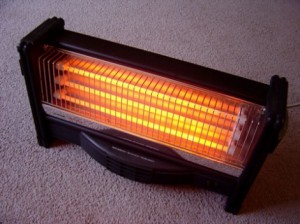 In Ithaca, it seems that the weather took a sudden dip a few weeks ago. Temperatures fell below freezing within a few hours, and it doesn’t look like they’ll warm much until spring. That was our cue to turn on the heat for the season.
In Ithaca, it seems that the weather took a sudden dip a few weeks ago. Temperatures fell below freezing within a few hours, and it doesn’t look like they’ll warm much until spring. That was our cue to turn on the heat for the season.
As much of the northern hemisphere launches into winter, millions of people across the country are firing up their home heating systems – an act that will cost most households hundreds if not thousands of dollars this year.
With those costs comes the natural inclination to save a little money. That’s when many – myself included, occasionally – turn to portable electric space heaters. When there’s a chill in the room, it seems so logical to flip a switch to warm a smaller space, instead of cranking up the heating system for the entire house. But are electric space heaters a good way to reduce your heating costs? The evidence says no.
Mark Pierce, extension associate at Cornell’s College of Human Ecology, is an expert in energy efficiency issues in residential buildings. He conducted a detailed analysis of heating costs in a 1,200-square-foot, three-bedroom house to determine if there is a benefit to using portable electric heaters.
Pierce asked the question, which is more expensive: heating the entire house to 70 degrees for three hours, or heating the house to 60 degrees for three hours and using a space heater to raise the temperature of one room to 70 degrees?
His analysis factored in all sorts of details like the levels of insulation in the floors, walls and ceiling, heat loss through windows and doors, and they type of heating fuel used. He assumed an outside air temperature of 10 degrees.
Using average costs for heating fuels in New York, he found turning down the thermostat from 70 to 60 degrees would reduce heating costs by about 50 to 80 cents, depending on the heating fuel used. Meanwhile, using a portable heater to heat one room from 60 to 70 degrees over the same time period would cost 52 cents – a meager savings, even when using the most expensive heating fuels.
But why is the cost of heating just one room with a space heater so high? Because electricity is about twice as expensive as fossil fuels, Pierce explains.
“Electricity is more expensive because it is a secondary form of energy, meaning that a primary form of energy – burning fossil fuels to power a generator for example – must first be consumed to make electricity,” he writes. “By the time electricity gets to your home from a power plant, about 70 percent of the energy consumed to create it has been lost due to generation and distribution system inefficiencies.”
Instead, Pierce recommends other ways to reduce your heating bills, such as adding insulation to your floors, walls and ceilings, installing a more efficient heating system and sealing holes and cracks around doors, windows and electrical outlets.
You can read more evidence-based tips about reducing your home heating bills by clicking here. Wishing you a warm and cozy winter!



I appreciate the experiment. But the results were hardly conclusive. The range given for savings from the whole house heating was wide at 50-80c, almost all of which was in excess of the cost of heating the single room, 52c. Most people would see that as neutral, or a small saving.
Thank you for that information. I would have thought that a space heater used in one room would save money. However, the evidence says otherwise!
I think the same, is very important isolate wall and window. The best is wood windows which isolate very good when is cold or hot. You have to remember as well about glass. So if is good building insulation you safe a lot of money.
I haven’t tried using portable heaters at home since we already have ducted heating system installed. I think there’s no harm in using portable heaters occasionally. Visit this blog http://goo.gl/h413n9 to read more about hvac efficiency.
Great article. I agree that more insulation and/or a more efficient heating system would probably be a better way to go in the long run. However, many people in this economy don’t have a few thousand dollars to invest in those upgrades. If you are in the more expensive range, costing the max of 80 cents, and you can reduce your costs to 52 cents, that would be about a 35% reduction with very little up front investment. As a temporary measure, that may work for some people.
Thank you for his article. Yes insulation is a great way to make a place more energy efficient. Also, another great way would be to replace your windows, especially if they are aluminum windows. Wood or vinyl work better. If the cost is too expensive you can also make some quick fixes to reduce window drafts.